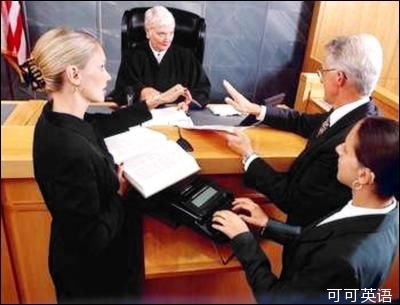(单词翻译:单击)

I never should have been an attorney.
我或许本来就不该当律师。
I am physically incapable of pulling all-nighters, I avoid conflict instead of pursuing it, and I have essentially zero drive to fight for the interests of multi-billion dollar corporations. So it did not come as much of a surprise to anyone -- except my mom and dad, perhaps -- when after exactly one year of practice at a big law firm, I turned in my BlackBerry and walked out the door.
我受不了整夜整夜地加班,我总是回避冲突、不愿跟着冲突走,我也没有什么动力来为规模几十亿美元的大公司争夺利益。因此,我的选择可能除了我父母,谁都不会奇怪:在一家大律所干了整整一年后,我交出了黑莓手机,选择离开。
Big Law is famously tough. But despite its reputation, law students continue to line up for consideration at the country's top firms, hoping to land a coveted spot as an associate. Many of these young lawyers, though, will find that they are simply not cut out for law firm life and, according to Pamela Woldow of law firm consultancy Edge International, approximately 70% will leave within the first four years of practice.
大牌律所出了名的压力大。但法律专业的学生们仍然排着队等候美国这些大律所的挑选,希望能够在这里谋得一个职位。很多年轻律师后来会发现,他们根本不适合律所的工作和生活,据律所咨询公司Edge International的帕米拉·沃都称,约70%的律师会在入行后四年内离开。
At a time when their very survival seems up in the air, how can firms spot and hire the few candidates that will thrive in Big Law instead of wasting time and money on people like me?
有些人能不能干得来还不好说,在这样的情况下,律所怎样才能发现和聘用日后能在大律所如鱼得水的应聘者,不把时间和金钱浪费在像我这样的人身上。
Woldow says that smart firms are beginning to change their hiring standards, selecting candidates who will stay longer than just a few years and who, upon making partner, will bring in their own business.
沃都表示,一些先知先觉的律所正在开始改变雇佣标准,选择那些不会呆几年就离开的应聘者,以及那些成为合伙人后能给公司带来更多业务的人。
According to Heather Frattone, associate dean for career planning at the University of Pennsylvania Law School, this means that firms are looking for more than just exemplary report cards. Depending on the firm, "communications skills, project management, organizational understanding, drive, initiative, resilience, and entrepreneurship" are all sought after qualities in recruits, but different firms place varying levels of value on these traits.
宾夕法尼亚大学(University of Pennsylvania)法学院职业规划副主任希瑟·弗拉顿表示,它意味着律所不再只注重出色的成绩单。根据律所的不同,“沟通技巧、项目管理、组织能力、内驱力、主动性、适应力和创业精神”是招聘时关注的东西,但不同的律所对这些特质的注重程度则有所不同。
Firm recruiters, Frattone adds, are beginning to ask more behavioral questions to identify candidates with the qualities they're looking for. "Things like, 'Tell me a time you were not successful at something you were working on, and what did you learn from that?'" These are the kinds of questions you might hear at any other interview. They just haven't had much of a role at law firms up until now.
弗拉顿表示,律所招聘人员开始询问更多行为方面的问题,寻找具有相关特质的应聘者。“比如,‘讲讲你一次失败的经历,你从中学到了什么?’”这是大家在任何其他行业的面试中都可能遇到的问题。但过去,这些问题在律所面试中不太会遇到。
But it's not enough for young lawyers to be smart, ambitious team players. Woldow advises looking for people with more life experience over candidates who went straight from high school to college to law school. "Maturity helps you roll with the punches a little more," she says. Candidates who have only worked within academia, who graduated at the top of their class, and are used to being lauded for their accomplishments often "don't understand that they're just the lowest of the low in a big machine." They have trouble taking orders, moving through Big Law's hierarchical structure, and putting in the required hours.
仅凭这些,还不足以确保年轻律师成为聪明上进的团队成员。沃都建议选择那些有更多生活经验的人,而不是直接从高中——大学——法学院一路读下来的学生。她说:“成熟有助于一个人应对各种压力。”只有学术经验、以最优成绩毕业、已经习惯了种种赞扬声的毕业生应聘者们往往“不会理解自己只处于大公司底层的底层这一现实。”他们会在服从指挥、按大律所繁复的等级制度慢慢晋升以及投入必要的时间方面遇到麻烦。
Psychotherapist Will Meyerhofer, a former associate at Sullivan & Cromwell and author of the legal blog The People's Therapist, thinks firms can keep associates around longer by only hiring people he calls "workhorses." These are the ones "who can just handle the brutal hours, who are very motivated by the money and making partner." He describes these people as "nerdy," "geeky," and "dorky," and with "fewer outside interests."
职业心理学家、法律博客The People's Therapist的博主威尔·迈尔沃弗也曾经在Sullivan & Cromwell工作过。他认为,律所可以只聘用“老黄牛”来确保员工效力更长的时间。这些人“能承担漫长的工作时间,能被金钱和胜任合伙人的前景鼓舞。”他把这些人称作“书呆子”、“极客”和“呆子”,“没有其他什么兴趣”。
But while plenty of firms will happily snap up those recruits, Williams & Connolly regularly takes cases to trial and looks for attorneys who will not only make a positive impression on clients, but on juries as well. "Someone who can only talk on a purely theoretical, academic level, is going to be more challenged here," says Williams & Connolly hiring partner Meg Keeley. Instead, Keeley says, her firm seeks "someone who can make arguments on a practical and personal level."
很多律所都乐意招这样的人,但Williams & Connolly会定期具体分析,寻找那些不仅能给客户、也能给陪审团留下积极印象的律师。“只会高谈阔论理论和学术的人会在这儿面临更大的挑战,”Williams & Connolly的招聘合伙人麦格·基利表示。基利称,事实上,她的律所是在寻找“能在实务和个人层面进行辩驳的人”。
And, of course, candidates should also have a real excitement about the actual practice of law. (Tip: Don't mention Law & Order in an interview.) These are the people that Meyerhofer says will happily "sit and argue over the best ways to draft certain provisions."
当然,候选人对于从事法律行业也应该真正有兴趣。【建议:不要在面试中提起《法律与秩序》( Law & Order)。】按迈尔沃弗的话说,要的就是那些能高高兴兴地“坐下来,争论如何更好地起草某些条款”的人。
A September, 2008 paper from UC Berkeley professors Marjorie Shultz and Sheldon Zedeck suggests that Keeley is onto something. Attempting to help law schools identify promising future lawyers, the report's authors examined a number of "predictors" of lawyering effectiveness. Typical measures of "geekiness" like LSAT scores and undergraduate grade point averages were not reliable indicators of later lawyering abilities. Instead, situational judgment tests, biographical information, and seven specific personality traits -- ambition, adjustment, sociability, prudence, interpersonal sensitivity, inquisitiveness, and learning approach -- could better forecast an applicant's later success as an attorney.
加州大学伯克利分校(UC Berkeley)教授玛约利·舒尔茨和谢尔顿·泽得克2008年9月的一份研究报告指出,基利说的有道理。报告试图帮助法学院发掘日后可能大有前途的律师,对众多可能预示未来律师职业能力的“预兆”进行了分析。典型的“好学者”标准,比如LSAT得分以及本科平均分,并不是反映日后律师职业能力的可靠指标。事实上,情景判断测试、个人经历以及7种特定人格特质——野心,适应力,社交能力,谨慎度,人际敏感度、好打探和学习方法——可以更好地预测应聘者日后作为律师的成功程度。
Of course, most firms would love to hire these social and inquisitive lawyers, but picking them out of the overflowing candidate pool is not always easy. Law students don't usually confess to their interviewers that they don't like to work hard or have no passion for practicing law.
当然,大多数律所都愿意聘用这些擅长社交、好打探的律师,但要在众多的应聘者中找到这些人并不容易。法律专业的学生们通常不会向面试考官承认,他们不喜欢拼命工作,他们对从事法律行业没有热情。
Woldow points to a few specific biographical indicators of future Big Law superstars: first-generation lawyers without legacies of Supreme Court justices and Big Law partners; first or second-generation immigrants; and people from modest economic backgrounds. These people, she says, often come in with different expectations. Instead of thinking they are due money and success, they think, "'I have to earn it and make my way.'"
迈尔沃弗指出,有几种背景可能预示未来会在大律所中获得成功:第一代律师,父辈不是最高法院大法官,也不是什么大律所的合伙人;第一或第二代移民;以及来自经济条件一般的家庭。她说,这些人进来的时候想法往往不一样。他们不会把获得金钱和成功视为必然,他们想的是“我必须要努力赚取这些,走出自己的路。”


